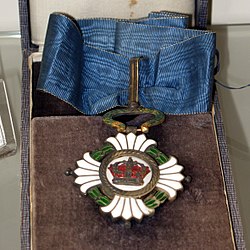
Sir David Petrie was Director General (DG) of MI5, the United Kingdom's internal security service, from 1941 to 1946.

Georg Karl de Scallon was a Russian general of Huguenot origin, Governor-general of Warsaw and the commander-in-chief of the Warsaw Military District from 1905 to 1914.

Božidar Janković was a Serbian army general commander of the Serbian Third Army during the First Balkan War between the Balkan League and the Ottoman Empire. In 1901 he served as Minister of the Army in the Ministry of Defence.

Dimitrije was the first Patriarch of the reunified Serbian Orthodox Church, from 1920 until his death. He was styled "His Holiness, the Archbishop of Peć, Metropolitan of Belgrade and Karlovci, and Serbian Patriarch".
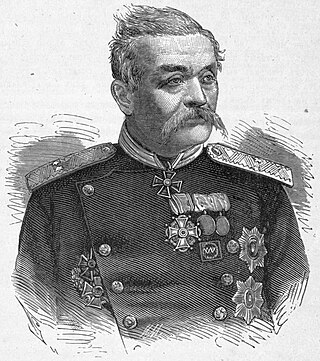
Nikolai Karl Gregor Freiherr von Krüdener was a Baltic German infantry general. He graduated from the Nikolayevskoye Engineering Academy in 1828 and upon graduation was appointed officer. In 1833 he entered the Imperial Military Academy and after graduation was general staff of the army where he was in charge of various administrative duties. In 1848 he took command of the regiment Prince Eugene of Württemberg. In 1858 he was commander of the Keksgolm grenadier regiment. Promoted major general in 1859, he took command of the Volyn Imperial Russian Guard Regiment.

Ibrahim Hakki Pasha was an Ottoman statesman, who served as Grand Vizier of the Ottoman Empire between 1910 and 1911. He served as Ottoman ambassador to Germany and to the Kingdom of Italy. Hakki Pasha also spent considerable amounts of time in London between February 1913 and the outbreak of World War I, working on negotiations concerning the Berlin-Baghdad Railway and a settlement for the Second Balkan War. During that visit, Hakki Pasha met with King George V. He was awarded the Order of Karađorđe's Star.
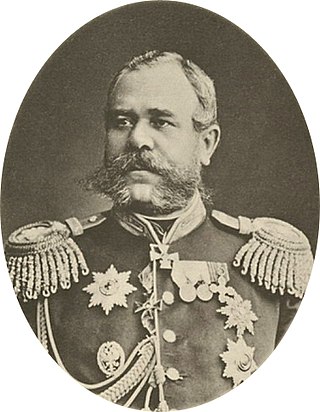
Nikolai Nikolayevich Obruchev (1830–1904) was a General Staff Officer in the Imperial Russian Army, military statistician, planner and chief of the Main Staff.
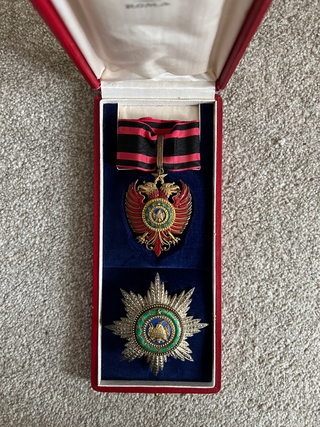
The Order of Skanderbeg was originally instituted in 1925 as an order of merit of the Albanian Republic. It was replaced by the Communist government in 1945 with a new award of the same name. Skanderbeg is the national hero of the Albanian people.

The Order of the Cross of Takovo was a Serbian state order.

Nikolay Alekseevich Khomyakov was a Russian politician.

Jovan Belimarković, was a Serbian general and politician.

Terty Ivanovich Filippov was a Russian folklorist, singer, pedagogue, the Honorary member of the Saint Petersburg Academy of Sciences. As a journalist, Filippov contributed mostly to Pogodin's Moskvityanin, Katkov's Russky Vestnik and Russkaya Beseda, the magazine he was a co-founder of. In 1857–1864 Filippov served as a Russian Orthodox Church official. In 1889–1899 he was the Chairman of the Russian State Control committee. He was awarded Serbian Order of Saint Sava and Order of the Cross of Takovo.

Grigorios Maraslis was an official of the Russian Empire and long-time mayor of Odesa (1878–1895) of Greek origin. A noted philanthropist, he sponsored many buildings and educational institutions both in Odesa and in various cities in Greece and for the Greek communities of the Ottoman Empire. He was awarded Order of the Cross of Takovo and Order of Prince Danilo I.
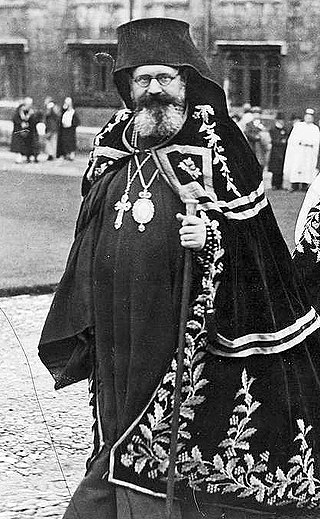
Stefan I was a Bulgarian prelate. He was elected Metropolitan of Sofia in 1922 and, from 1945, also served as Exarch of the Bulgarian Orthodox Church. He actively contributed to the rescue of the Bulgarian Jews in World War II. He was awarded Order of the White Eagle and other decorations.

Fyodor Fyodorovich Radetsky was a Russian general of German-Silesian extraction. He founded the city of Krasnovodsk in 1869. He commanded the Russian forces at the 3rd stage and 4th stage of the Battle of Shipka Pass.
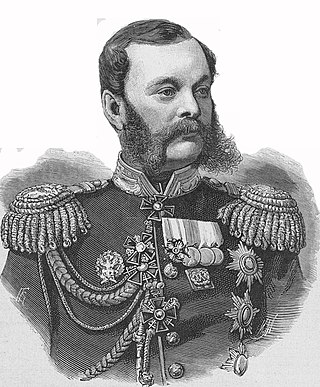
Apostol Spiridonovich Kostanda was an Imperial Russian division commander. He fought in wars in Crimea and Poland. He commanded the military forces in Moscow from 1888 to 1896.
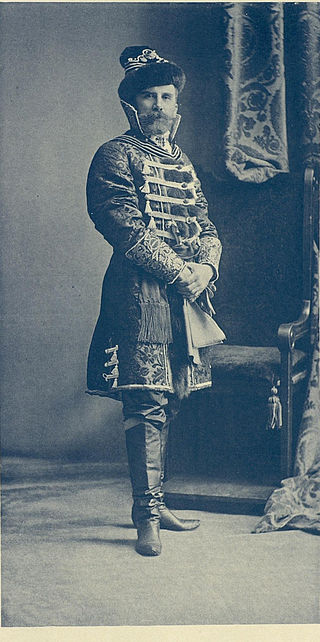
Konstantin Nikolai Freiherr von Stackelberg was a Baltic German composer and cavalry general in the Imperial Russian Army. Stackelberg was best known for his compositions on music about the White Army during the Russian Civil War. He was the head of the Imperial Music Choir from 1883 to 1917 and was also involved in improving the music in the Russian Army and Navy.

Janusz Gąsiorowski was a Polish general, commander of the Polish 7th Infantry Division during the German invasion of Poland in 1939. Taken prisoner on 4 September in the battle of Częstochowa. He was awarded the Serbian Order of Saint Sava and a number of other decorations.

Aleksa Jovanović was a Serbian judge and politician who held the post of Prime Minister of Serbia and Minister of Foreign Affairs.
